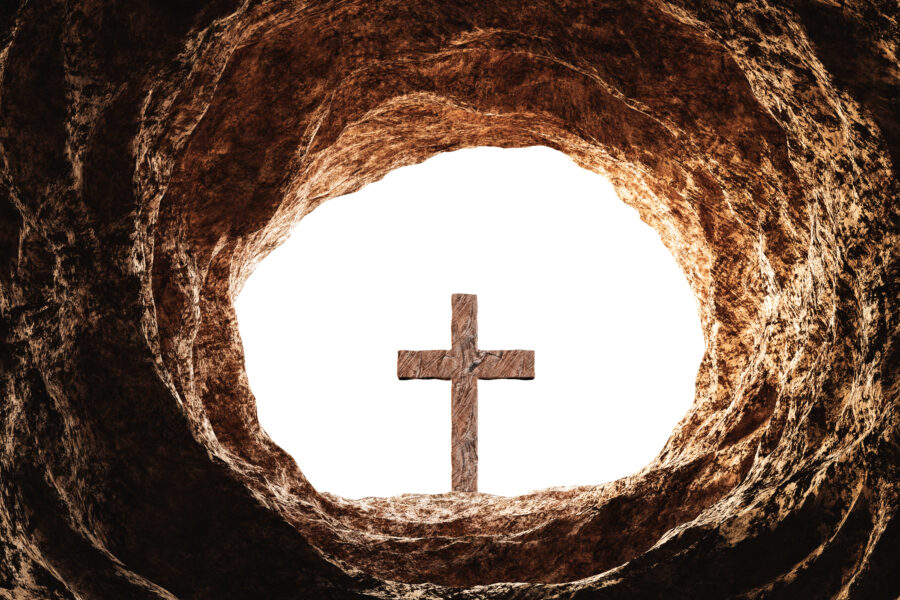Jay Blogs – The Rising

Like all the rest of you, my family and I celebrated Easter two weeks ago. I was reflecting on the impact that the most critical moment in human history has had on all our lives.
The Resurrection of Jesus was not only the critical moment in the history of the Church, or the most important thing that happened in the life and ministry of Jesus, or our most important holiday as Christians. The Resurrection is way more than that. It has a game-changing impact on our lives and is imminently relevant to how we see everything.
The Resurrection means we’ll be resurrected as well. One of my favorite, yet most difficult, roles as head of school is serving as a kind of pastor to our school families. Over the years, I’ve walked with families through illness, job loss, and the and the deaths of parents, spouses, and even children. I’ve seen grief that’s unimaginable, and as a pastor, God has given me love and the ability to feel and suffer with each of these people. Over the course of this past year, I’ve written about some struggles in our own family, as my father continues to endure the ravages of Alzheimer’s, and one of my daughters still struggles with a now-year-long recovery from a brain injury.
As one of my favorite Christian artists, Phil Wickham, sings, “Life is a war fought with tears.” Suffering and pain are parts of life in Genesis 3, a broken, fallen world. But the Resurrection teaches us that death and suffering are the roads to redemption.
There’s a great book by Paul Miller called “The J Curve: Dying and Rising with Jesus in Everyday Life.” Miller talks about the process of becoming more like Jesus and of sanctification. He describes it as a J-curve, whereby in our sin and brokenness we go down with Jesus, joining him in death, finding death in those things that inhibit us, holding us back, even those blind spots that are hidden.
Pain is often the catalyst that brings us to the J-curve: pain from our own past sin and that of others that impacts us; pain from being misunderstood; and pain from guilt and shame. We bring those down into the grave with Jesus, where we have the opportunity to put to death their corrupting influence over our lives. And, when we rise with him, into resurrection, into victory, we find we’re something we weren’t before, something new, free of those things and the power they have over our lives, by the blood of Jesus and through the power of the Holy Spirit.
We go through this process again and again throughout our lives: through trials, through challenges, through suffering, engaging in the hard work of sanctification, dying to the old self and being born anew, in the constant state of becoming. The Resurrection is the promise that one day this process will end in perfection, that every tear will be wiped away, and that we’ll be made new, whole, and complete, as was Jesus. And, like him, a new creation.
The Resurrection means that “the kingdom has come.” The gospel as Jesus preached it isn’t simply “pray a prayer, receive Jesus into your heart, and you will live eternally with him forever.” That’s part of it, but if we stop there, we’ll not only lose the fullness of what God is actually doing in our lives and what He offers us, but we’ll also sell short the totality of what Christ’s death and resurrection accomplished. Christ constantly preached about the coming of “the Kingdom of God,” and the gospel as he preached it is reflected in the words of the prophet, the words we sing at Christmas every year, in Handel’s Messiah: “the kingdom of the world has become the kingdom of the Lord and of his Christ.”
Jesus’ resurrection means that the Kingdom of God has come on earth, and from the day Jesus arrived, He has been forcing out the Kingdom of the world: pressing into it, defeating it street by street, and stronghold by stronghold. Jesus didn’t ascend into heaven, take a time out, or use the past two thousand years as a really long halftime until he’d come again to make all things new. He is actively engaged in the work of redeeming the world right now. God is now reigning.
The good news is that the world isn’t out of control. The bad guys aren’t winning. Evil isn’t ruling, no matter how exasperating or frustrating life seems sometimes. Because of our flesh, we have a negative bias, and we tend to view the world through a broken lens. That’s on us. The reality is that your world is not out of control but under God’s careful, thoughtful, intentional, and redemptive control. Which means we have hope, even when it looks to us like evil is winning.
As I Cor. 15 tells us, God is in the process of putting the enemies of his redemptive purpose under his feet. He is relentless. He will not rest. He will not back down, and he will not stop until sin and death are defeated. What’s more, he has chosen us to be a part of that work. If you are his disciple, you are a son or daughter of the High King of heaven, not just his servant but his friend and his child. He has called you to join him in this redemptive work by bearing witness, which means pointing to the Kingdom of God through your words and actions every day.
The Resurrection means we live under grace, moment by moment. The Resurrection instituted the system of grace upon the earth, God’s unmerited favor given to us through Jesus Christ. This means that God gives us something we can’t earn, don’t deserve, and can only accept. Jesus’ resurrection is the only way. As Paul says, “if you confess with your mouth that Jesus is Lord and believe in your heart that God rose Him from the dead, then you will be saved.” (Rom. 10:9).
Sometimes, we act as if this is a “one-and-done” thing: we pray the prayer, accept the grace, then go on with our lives as before, trying to earn our way through our actions. Whether we really believe it or not, this is often how we live. It’s why failure often makes us so frustrated with ourselves. Our standard as workers, wives, mothers, fathers, husbands, coaches, or whatever is often crippling perfection. Deep down, we live as if we believe that by hitting this goal, we will somehow put ourselves in a position where we’ll be entitled to earn things from God, demand things from him, rely on our rights, and fall back on our part of the transaction to secure his good things.
If we live long enough, have enough experience under our belts, or if our kids or other loved ones go through enough things, we eventually come to the point where we realize that pushing the buttons, pulling the levers, and doing everything right doesn’t guarantee the predicted outcome. We come to the place where we realize we’re abject failures on our own, and all our attempts at self-improvement amount to putting eye shadow on a bulldog. The healthiest thing we can do is recognize our own utter brokenness, our need for Jesus, and rejoice in the reality that the gift of the resurrection is not just one-time grace but a God who lovingly dispenses grace like mother’s milk because we need it to survive. Every single day.
The Resurrection means we live an embodied life forever. Jesus wasn’t resurrected in spiritual form. He didn’t appear to the disciples or ascend into heaven as a spirit being, and he didn’t eject his earthly body before he sat at the right hand of God the Father. Jesus was resurrected in bodily form and lives now in body as the God-man. Jesus’ embodied resurrection has huge implications for us because it means how we live in and treat our bodies matters infinitely.
Our bodies are a part of the whole being that we are. This is why holiness is so important to Paul and to Jesus in Scripture. It’s not because they were interested in some kind of puritanical prudishness or wanted to steal everyone’s fun. Instead, they understood the reality that we are always whole beings—body, spirit, and soul—and we can’t divorce our bodies from our souls. When we train our bodies, we also train our souls. When we corrupt our bodies sexually or through addiction or other means, we also corrupt our spirits and our souls. Our gender (as biblically, not culturally understood) is an inherent part of who we are as human beings, as much a part as our souls, tied to the very character and nature of God in us. When we deny our gender, we are denying the image of God in us as surely as any other aspect of our God-created being.
Likewise, when we worship our bodies through over-exercising or other excessive care, when we go beyond stewardship to desperate preservation, obsess about them, neglect or abuse them, or treat them in any way other than respecting them as the dwelling place of the Most High God, we deny the lessons of the Resurrection, we give them a role that’s either too high or too low, and we either cheapen them or elevate them to a degree God never intended and to our ultimate harm.
The Resurrection was a cataclysmic event, changing everything about us, our creation, our past, and our future.
